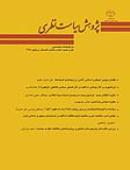بررسی مقایسهای چارچوبهای تحلیلی و روششناختي مطالعات نفت وسیاست
محورهای موضوعی : پژوهش سیاست نظری
1 -
چکیده مقاله :
این مقاله بر آن است تا با رویکردی مقایسهای نشان دهد که ادبیات دولت رانتیر در خلال حدود چهار دهه اخیر خلاف تصور رایج، نه به لحاظ محتوی و نه از نظر روش مطالعات، وضعیتي یکدست نداشته و فراز ونشیبهای بسیاری را طی کرده است. این مطالعات را از نظر چارچوبهای تحلیلی وروشي، به دو دسته متمایز از هم تقسیم کردهايم. نسل اول این مطالعات از دهه 1970 آغاز شد اما ناکامی تحلیلهای رانتیری در توضیح شرایط کشورهای نفتخیز و تبیین آثار کاهش شدید درآمدهای نفت در دهه 1980، انتقادهایی جدی را بر انگیخت. نقدهایی که در ارتباط با موج نخست این مطالعات مطرح شد، زمینه بازنگریهای اساسی را در روش مطالعات و شیوه مفهومسازی رانتهای خارجی و سنجش آنها فراهم کرد. در نتیجه به تدریج موج دومی از این دست مطالعات بویژه از دهه 1990 شکل گرفت که میتوان آن را نوعی تجدیدنظرطلبی در مطالعات دولت رانتیر در نظر گرفت. این رویکرد بتدریج متغیرهای تازهای در مطالعات وارد کرد و به پیشینه تاریخی کشورهای نفتخیز و زمان ورود درآمدهای نفت(با توجه به مراحل مختلف شکل گیری دولت و رژیم حاکم) توجه بیشتری نشان داد. همچنین با پرهیز از نگاه ساختاری به رانتهای نفتی، بر رابطه دو سویه میان این گونه رانتها و شرایط اجتماعی، سیاسی کشورهای نفتخیز تأکید کرد. شماری از هواداران این رویکرد جدید نیز معیارهای تازهای برای سنجش آثار درآمدهای نفتی پیشنهاد کردند. این رویکرد جدید، امکان ارائه تحلیلهایی پیچیدهتر را بویژه در حوزههای ثبات سیاسی و گذار دموکراتیک در کشورهای نفتخیز فراهم کرد؛ تحلیلهایی که تجربههای متفاوت دولتهای متکی به صدور نفت را در این حوزهها بهتر توضیح میدهند.
This paper aims to show that, during the past four decades, the literature on Rentier State, contrary to popular opinion, has not been consistent, whether in content or in methodology. Based on their methodological framework, the studies have been classified into two distinct types. The first generation of studies emerged in 1970s, but their failure at explaining the situation of oil-rich countries and clarifying the consequences of fall in oil incomes sever criticisms. The criticisms in connection with the first wave of the studies provided a ground to revise the methodology, and the way of conceptualizing foreign rents and their assessments. This resulted, particularly since 1990s, in the second wave of studies a wave that could be considered as revisionism. This approach brought new variables into the studies. It paid more attention to the historical background of oil-rich countries and the historical periods when oil incomes raised (with respect to the various stages of formation of the government and the regime in power). It focused on the interrelationship between oil rent and social and political condition of these countries, avoiding structural look to the oil rents. Some of the supporters of the new approach proposed new criteria for evaluation of oil incomes. This approach offered the possibility of more complex analyses, especially in the areas of political stability and democratic transition in the oil-rich countries, analyses that better explain different experiences of the oil-dependant states.


